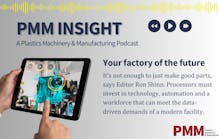By Karen Hanna
As a cub reporter, I went to my editor in tears because I’d screwed something up. It seemed like a big deal at the time; I don’t remember now what it was.
But he listened intently, pulled out a ruler, tapped the desk with it and admonished me, “Go, and sin no more.”
“You’re not going to yell?”
“No,” he said. “I’ve hit the desk, instead of slapping your wrist. That’s enough.”
I thought of that editor over recent weeks as I’ve interviewed people about lean manufacturing. I also thought about the editor who told people under her we’d be fired if we made any mistakes.
So, we just never told her when we did.
Who do you think I still talk to 20 years later?
Who got employees’ best effort?
As another employer many years later told me, “Mistakes prove you’re human. How you handle them tells you what kind of human.”
At a time when many manufacturers are having trouble finding people to man the machines, lean manufacturing advocates like Carl Livesay, GM of Mercury Plastics MD, remind us that the most important, most valuable resource in any company is its people.
Not your material. Not your machines. Your people.
Did you think a conversation about lean would be about people?
They’re fallible, they’re unpredictable, they’ll make you nuts. (I know this, as many past editors have described me in just these ways.)
But, if you came to a lean manufacturing article hoping to play a bingo game searching for jargon, like KPIs or kaizen or gemba, I’m sorry. You’ve come to the wrong place.
This is a story about people — and having the humility to know everyone has a perspective that might help you.
A line operator who punches in and out without saying a word knows things about the machine where he or she is stationed that you don’t. Unless you ask.
In recent years, collecting the thoughts of every stakeholder has become something of an obsession. Whether it’s the kid working drive-thru or the clerk at the pharmacy, they’re all shoving arm’s-length receipts at us asking for our input about our soggy burgers or the prescriptions we have to take because we eat that fast food.
Problem is, asking isn’t enough.
A survey of employees’ opinions means nothing unless you intend to trust their answers and make changes based on them.
That’s what Livesay did when an employee said she needed better lighting.
It looked fine to him, but his job wasn’t inspecting small parts for even smaller defects.
So, up went the lights, and down came the defects.
Simple, right?
But it’s not.
Employers who seek their employees’ input but don’t act on it (or worse, react with hostility) quickly cultivate in employees the same attitude. You know this: It’s why you’ve never actually done an online survey after a trip to the grocery store.
You must realize, too, that helpful input probably doesn’t sound like, “Everything is GREAT!” It might take a more critical tone — if you’re willing to listen, those kinds of comments might help you chart a path toward improvement.
If you want my opinion, show me how it will make a difference.
As of May 2023, according to the U.S. Bureau of Labor Statistics, just under 1 million manufacturing jobs were unfilled. And it won’t get better — in a 2021 report, the Manufacturing Institute and Deloitte predicted a shortfall of 2.1 million jobs by 2030.
To be fair, much of that is demographics. But not all of it.
And of course, as we’ve written countless times, automation can help plug some of the gaps. But robots — as of now — can't help you think through problems like supply chain delays or an unexpected surge in products, such as PPE, as we witnessed during the pandemic.
So far, only people do that.
Show me what it’s like to work for you, and I’ll wager a guess how much a labor shortage might hurt you.
If it’s awful — as it was under the editor who saw every error as a pretense to termination — people will find new opportunities.
While they’re looking, they definitely won’t be giving you 100 percent. Because you only get what you give.
That editor who slapped the desk and sent me on my way?
Every person I know who has ever worked for him counts him as a friend and mentor.
Every. Single. One.
Rest assured, however you treat people, good or bad, they’ll remember you.
Karen Hanna, senior staff reporter
Karen Hanna | Senior Staff Reporter
Senior Staff Reporter Karen Hanna covers injection molding, molds and tooling, processors, workforce and other topics, and writes features including In Other Words and Problem Solved for Plastics Machinery & Manufacturing, Plastics Recycling and The Journal of Blow Molding. She has more than 15 years of experience in daily and magazine journalism.
High-tech skills come at high price
So, you need a new ERP. Now what?






